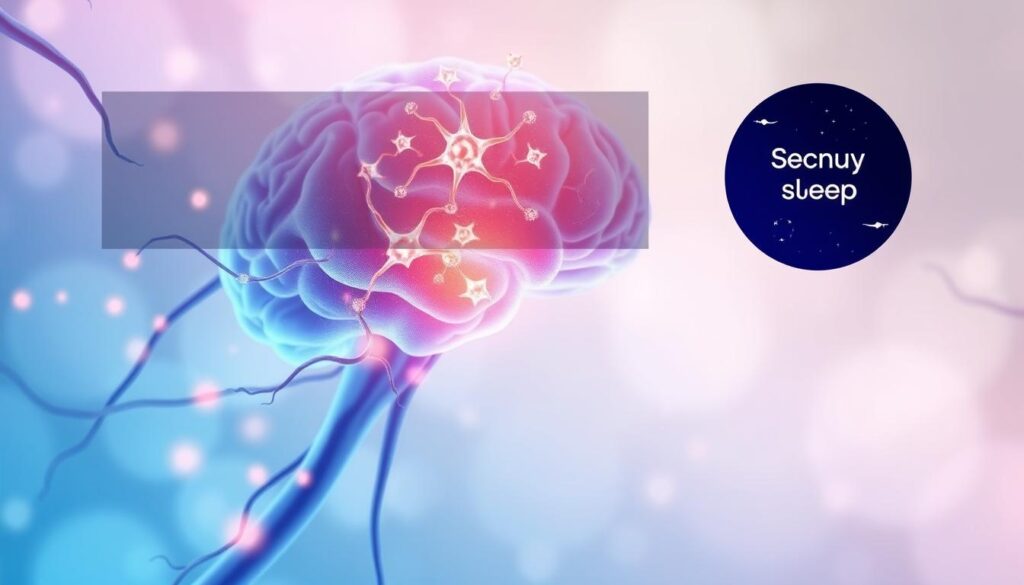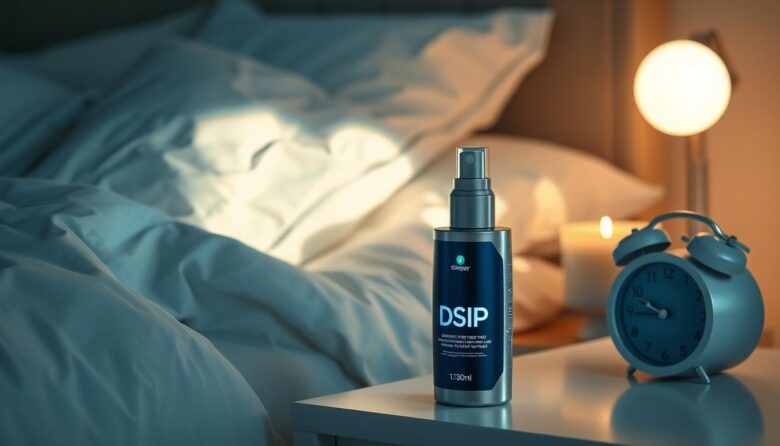If you’re having trouble sleeping, you might have heard about DSIP nasal inhaler. This peptide was first found in 1977 and has been studied a lot. It helps with sleep and has other health benefits.
Research shows DSIP can lower stress hormones and help with hormone balance. It also protects the brain and fixes brain imbalances caused by lack of oxygen.
See our choice for DSIP peptide here >>>
This study looks at DSIP’s effect on rats with stroke. It found that DSIP can help rats recover faster. This could mean better sleep for people too.
We’ll dive into how DSIP works for sleep, its benefits, and how it might help with sleep problems. This includes helping with addiction withdrawal symptoms.
Introduction to DSIP Peptide
What is DSIP?
DSIP, or delta sleep-inducing peptide, is a special peptide found in 1977. It was discovered by the Schoenenberger–Monnier group in Basel. This peptide has many roles in the body, some quite surprising.
It can lower corticotropin levels and boost luteinizing hormone release. It also triggers the release of somatoliberin and somatotropin. DSIP has stress-protective and adaptive properties, and it’s even neuroprotective.
Studies on DSIP in male rats showed it can fix brain neurotransmitter imbalances caused by lack of oxygen. This is very interesting.

The delta sleep-inducing peptide has a wide range of effects on the body. It’s drawing a lot of attention from researchers and doctors. They’re excited to see how it can improve human health and wellbeing.
Mechanism of Action: How DSIP Affects Sleep
The exact way Delta Sleep-Inducing Peptide (DSIP) affects sleep is still a mystery. But research shows it works with neurotransmitters. It seems to affect both the brain and the body’s nervous system.
DSIP has been found to calm down brain activity and boost blood flow in stressed animals. This shows it might protect the brain. These actions could help DSIP induce and regulate sleep.
Also, DSIP changes how free radicals react in rat organs under stress. A DSIP product called Deltaran has been linked to fewer chromosome problems in bone marrow cells.
More research is needed to understand how DSIP impacts sleep. Studies are looking into how DSIP interacts with neurotransmitters and the body’s stress and aging responses. This could help us learn how to improve sleep and health.
| Study | Findings |
|---|---|
| Popovich et al. (2006) | Noted an increase in plasma urea level and decreases in fractional urea excretion with age, relevant for clinical applications in the syndrome of inappropriate secretion of antidiuretic hormone. |
| Mech. Aging Dev. (2003) | The effect of Delta-Sleep Inducing Peptide-containing preparation Deltaran on biomarkers of aging, life span, and spontaneous tumor incidence in female SHR mice was examined. |
| Izv. RAN (1993) | The alteration of intensities of free radical reactions in rat organs at hypokinetic stress and protection by inducing Del’ta-Son Peptide was discussed. |
| Lab. Delo (1988) | A method for determination of catalase activity was described. |

DSIP Nasal Inhaler and Sleep Quality
If you have trouble sleeping, the dsip nasal inhaler for sleep might help. The benefits of dsip nasal spray come from DSIP (delta sleep-inducing peptide). Research shows it can improve sleep quality when used as an intranasal spray.
Intranasal Administration of DSIP
DSIP is a powerful peptide that affects sleep. It has a molecular weight of 850 daltons and a molecular formula of C35H49N10O18P. Studies show it improves sleep efficiency and reduces sleep latency in people with chronic insomnia.
DSIP also helps with chronic and severe pain, like migraines and headaches. It can reduce stress and free radicals in the brain. This makes it a good option for treating sleep and pain issues.
| Key DSIP Statistics | Findings |
|---|---|
| DSIP Effects on Sleep | – Improved sleep efficiency and reduced sleep latency in chronic insomnia patients – Increased slow-wave sleep (SWS) in middle-aged and elderly individuals with chronic insomnia |
| DSIP Effects on Pain | – Significant reduction in pain levels for patients with migraines, headaches, tinnitus, and psychogenic pain – Therapeutic benefits in chronic and severe pain episodes |
| DSIP Effects on Withdrawal | – 97% of opiate addicts and 87% of alcoholics showed improved or disappeared clinical symptoms after DSIP treatment – Holds promise as a potential treatment for withdrawal syndromes caused by alcohol and opiates |
The dsip nasal inhaler for sleep and benefits of dsip nasal spray are promising. They could help improve sleep quality and manage sleep and pain issues through intranasal dsip for sleep enhancement.
Potential Benefits and Applications
Treating Addiction Withdrawal Symptoms
The DSIP peptide might help with sleep and also with addiction withdrawal symptoms. Studies show it can ease the discomfort and cravings of substance abuse withdrawal. This makes it a promising tool in addiction recovery.
DSIP works on the brain’s reward and stress systems, which are often out of balance in addiction. It may help reduce withdrawal symptoms like anxiety, irritability, and insomnia. These symptoms often push people back to substance abuse.
Researchers are looking into DSIP nasal sprays and injections for managing withdrawal from alcohol, opioids, and other addictive substances. Early results suggest DSIP can reduce cravings and withdrawal distress. This could help in detox and rehab.
As an anti-stress agent, DSIP may also help with the emotional challenges of addiction recovery. Its ability to aid sleep and treat addiction withdrawal symptoms shows its potential in addiction medicine.
Conclusion
DSIP nasal inhaler peptide might help improve your sleep and manage sleep issues and addiction withdrawal. Studies show it works by affecting the brain and sleep processes. This makes it a handy option compared to older methods.
Research found DSIP can boost your heart rate and change brain activity under anesthesia. It also affects how deep you sleep. These results suggest DSIP could be a good choice for better sleep and managing related problems.
The benefits of dsip nasal inhaler for sleep, dsip peptide benefits, and intranasal dsip administration are worth more study. As sleep and addiction treatments evolve, DSIP could offer a new, effective way to help people sleep better.










